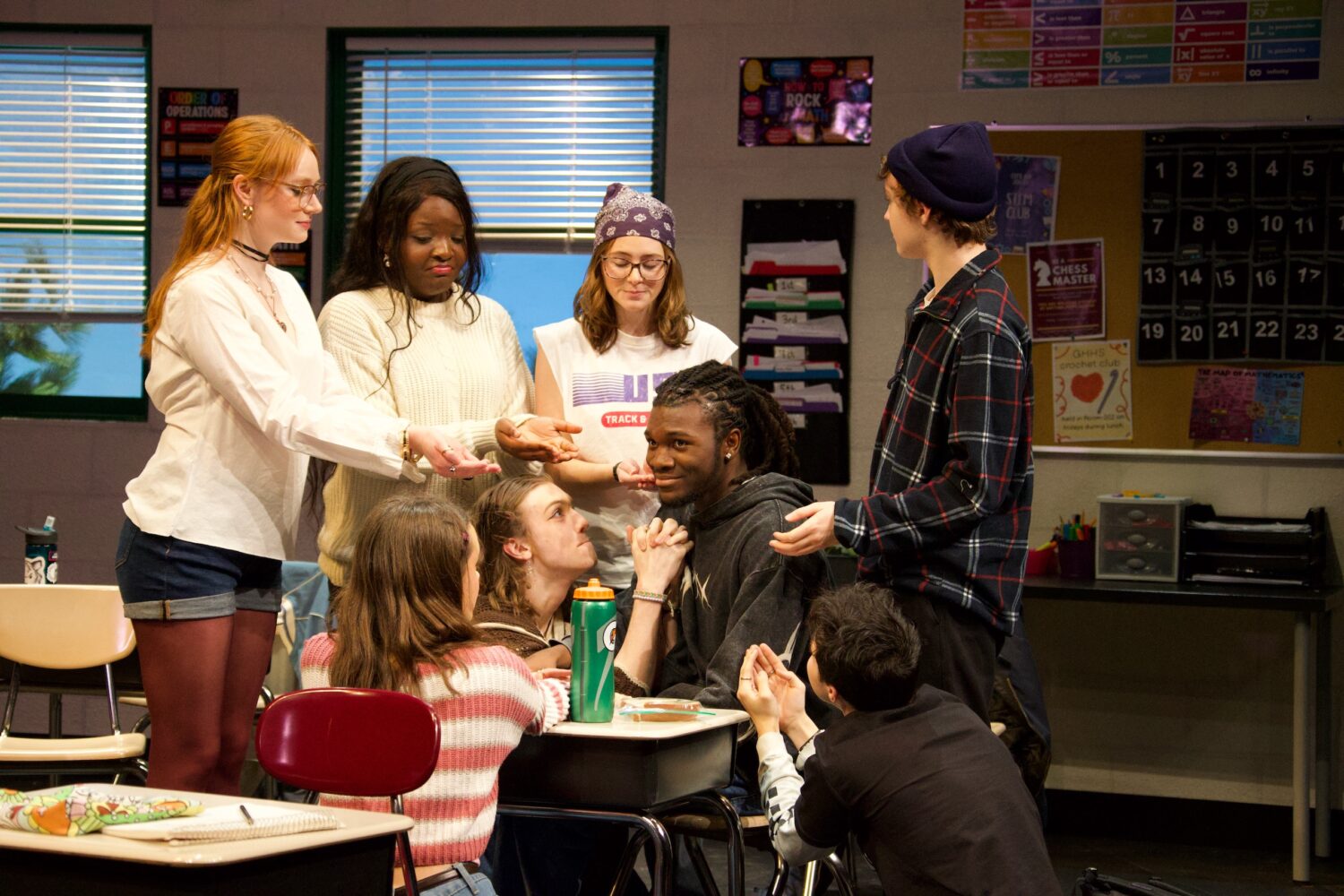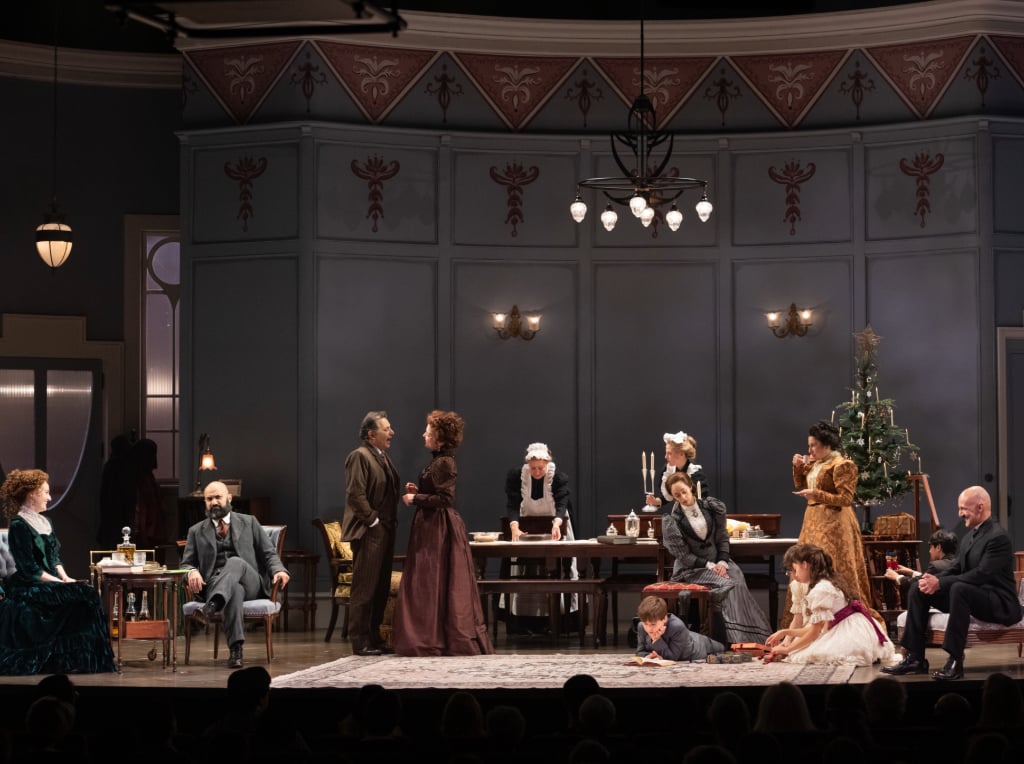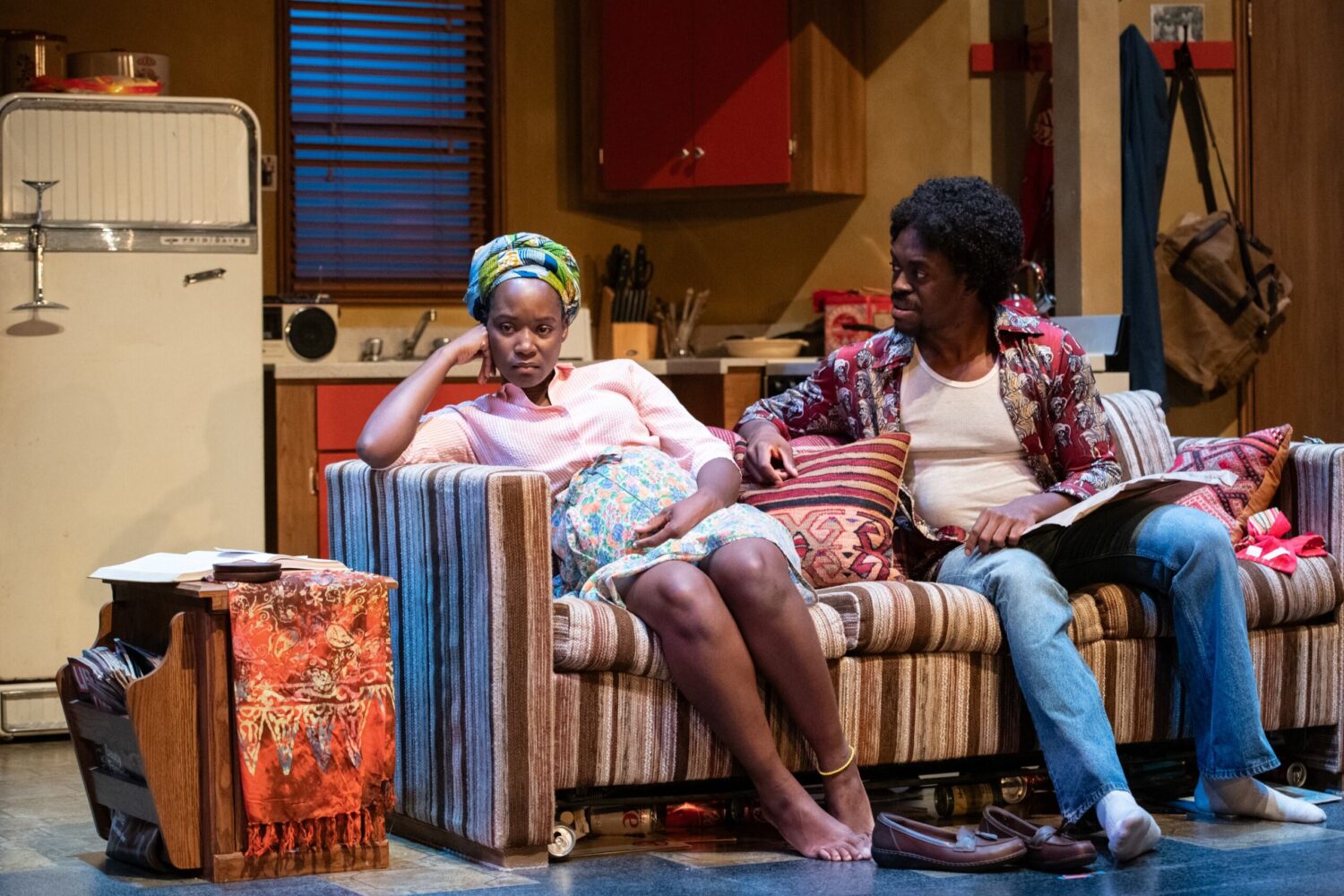Arena Stage has just announced that Helen Hayes Award-winner Eleasha Gamble will play Laury in the production of Oklahoma! that opens next week. She’ll take over the role from Valisia LeKae, who pulled out of the production. Gamble, who just completed a run in Signature Theatre’s production of Chess, was profiled in the September 2006 issue of The Washingtonian. At the time, the Maryland native and Catholic University graduate was just beginning to make a name for herself on local stages. That article appears below the jump.
Razzle Dazzle
Musical stars have to be able to sing, dance, act, and make it all look easy. Here are some of the best, coming soon to a theater near you.
By Leslie Milk
There’s nothing like a musical to excite a theater audience. The conductor raises the baton, the orchestra launches into the overture, and the crowd sits a little straighter in the seats. Then the stage lights up and performers burst into song. They make it look effortless. But starring in a musical is the toughest role onstage.
Musical stars have to be “triple threats,” able to sing, dance, and act, says Eric Schaeffer, artistic director of Arlington’s Signature Theatre. Schaeffer and Signature have earned national acclaim for their musical productions.
What’s more, musical stars have to stay in character while their voices scamper up the scales and their feet dance across the stage. “The audience has to believe it,” Schaeffer says. He looks for “someone who has the spark, the personality they can bring across the footlights.”
When Signature begins its season with the Lerner and Loewe classic My Fair Lady, two of Washington’s favorite actors—Will Gartshore and Eleasha Gamble—will be onstage.
Gartshore won a 2006 Helen Hayes Award—the local equivalent of Broadway’s Tony Award—for his performance in Urinetown at Signature. He was also nominated for Schaeffer’s production of Pacific Overtures.
Not bad for a guy from Sault Sainte Marie, Ontario, who didn’t get into the Canadian version of Juilliard. In his first musical—a community production of Jesus Christ Superstar —Gartshore was cast in the chorus. “I sang flat, but I had a big voice,” he recalls. His voice improved with practice: Five years later, when the musical was produced there again, Gartshore played Jesus.
In 1994, Gartshore moved from Ontario to New York to study acting. Four years later, at age 23, he was on Broadway in Parade. The next year, Eric Schaeffer brought him to Washington to star in Floyd Collins. He’s been wowing Washington audiences ever since.
Gartshore thinks of himself as an actor first, a singer second. “Musicals allow actors to encompass high emotions without seeming extreme,” he says. Over the years, too, he has developed a dancer’s sensibility. “I know how to use my body to tell a story,” he says.
Eleasha Gamble will play several parts in My Fair Lady and return to Signature later this season as the witch in Sondheim’s Into the Woods. She impresses directors with her powerful soprano—what one critic called “a booming voice filled with a wealth of soul.”
The Catholic University graduate started as a sixth-grader in the choir at St. John the Baptist de La Salle Church in Chillum. She learned an important lesson about theater the following year: Be prepared for rejection. A new choir director booted Gamble.
“He asked me to come back a few years later,” she says.
By her freshman year at Catholic, Gamble started getting parts in area theaters. In 2001, her senior year, she auditioned for Schaeffer. He cast her in Company, performed at Lubber Run Ampitheatre in Arlington. That led to roles in Signature’s productions of Grand Hotel and The Gospel According to Fishman and Schaeffer’s New York production of Under the Bridge.
“Signature feels like home to me,” Gamble says. But she’s open to offers. For 2004–05 she was a Helen Hayes nominee for her roles in productions at Round House Theatre and Toby’s Dinner Theatre in Columbia. This summer Gamble spent three weeks at Virginia Tech working with Arena Stage artistic director Molly Smith on a new musical based on the novel The Women of Brewster Place.
Molly Smith is having a love affair with the American musical. Like anyone in a new romance, she tends to gush.
The musical, she says, “is uniquely American. It’s our seminal art form.” Smith didn’t always feel that way. She admits that she considered musicals a step below plays. Arena supporters Gilbert and Jaylee Mead helped persuade Smith to direct South Pacific in 2003. Now a musical is the linchpin of every Arena season.
“Musicals are the most subversive form of theater,” says Smith. In South Pacific, Rodgers and Hammerstein confronted racism a decade or two before most Americans dealt openly with the issue.
Smith chose Cabaret, Arena’s first production this season, because of its message as well as its music. “I’ve been watching our rights being eaten away in America,” Smith says. “The same thing happened in Germany during the Weimar Republic.”
Cabaret’s two leads, Brad Oscar and Meg Gillentine, starred in Arena’s Damn Yankees in 2005.
Damn Yankees was Oscar’s first professional theater job in Washington: The Rockville native starred in The Producers on Broadway and in London before he was “discovered” by his hometown.
“It was a thrill to be working in a theater where I saw some of my first shows,” he says.
Oscar started performing in his basement, took classes at the Jewish Community Center in Rockville, and starred in musicals produced by the JCC’s summer-theater program for kids.
The summer of 1979, Oscar played Fagin in Oliver. “People took notice,” Oscar says. He was hooked.
He majored in theater at Boston University. Even then, he never played a character under age 50. Oscar knew he was destined to be a “character actor”—the guy who gets the laughs and the applause but not the girl.
Character parts are harder to find than roles for fresh, young faces, Oscar says. He spent a lot of time in New York waiting tables at Charlie’s, a theater hangout, while auditioning for roles. He had a few good runs in Jekyll & Hyde and Forbidden Broadway, but such roles alternated with less glamorous work like playing Santa Claus in a Christmas show in LA and in Branson, Misssouri.
In 2001 Oscar got his break. He’d been cast as a member of the chorus in The Producers and was the understudy for Nathan Lane, who starred as producer Max Bialystock, and for Ron Orbach, who played Franz Liebkind, the crazed Nazi whose musical, Springtime for Hitler, Bialystock decides to produce.
The Producers was still in pre-Broadway tryouts in Chicago when Orbach hurt his knee. Oscar stepped into the part and was nominated for a Tony.
A year later, Nathan Lane was ready to retire his Bialystock. The producers hired an English actor named Henry Goodman to replace Lane. After 30 performances, Goodman was fired, and Oscar was asked to take the lead. He went from Santa Claus to Broadway star in less than three years.
Oscar will play the emcee in Cabaret, a part that should have him on stage for almost every scene. “Physically and vocally this will be a challenge,
” he says. “Maybe it will help me take off a few pounds.”
Oscar’s costar, Meg Gillentine, isn’t worried about the physical part of the job. Dancing is her strong suit. When Molly Smith cast her as Lola in Damn Yankees, “she totally took a chance on an ex-chorus girl,” Gillentine says. Her sexy portrayal of Lola won her a Helen Hayes for best lead actress in a resident musical.
Gillentine grew up in Georgia, danced with the Atlanta Ballet, and was introduced to musical theater at a performing-arts high school. As soon as she started at New York University, she auditioned to be a Rockette. The Rockettes said yes, but the university said no way.
Gillentine didn’t take no for an answer. She auditioned for Cats the following year. This time NYU not only approved but gave her academic credit for her work onstage.
By the time she graduated, Gillentine had logged as much time on Broadway as in the classroom. She grabbed her diploma and headed out on the first national tour of Fosse. Later she got a spot in the Broadway production, where she worked with Gwen Verdon, the original Damn Yankees Lola.
Gillentine has worked steadily ever since. She now lives in Los Angeles, hoping to get more work in television and movies. In the movie version of The Producers, Will Ferrell got the part of Liebkind; Oscar and Gillentine had bit parts.
Gillentine, Oscar, Gartshore, and Gamble are among the lucky ones. Most talented musical stars—like most actors—need day jobs to support their theatrical habit.
Washington theater veteran Sherri Edelen, a Helen Hayes winner who is also in Cabaret, has worked for a bankruptcy trustee and taught acting classes. She’s sung in theatrical cabarets and performed in some unusual places: For the reopening of the National Portrait Gallery, she played Abigail Adams in a concert version of 1776. She’s been hired to do a lot of role-playing—for instance, as a patient in Johns Hopkins clinical-education programs. Fellow actors have been hired by the FBI and police departments to play terrorists, hostage takers, and other characters.
Edelen admits that she has an obsession about not getting into debt—a byproduct of her bankruptcy job. But she is too stagestruck to give up theater.
She took a circuitous route to professional theater and to Washington. First she auditioned for Opryland, a musical theme park in Nashville. She was hired and promptly quit her job at TicketMaster. Opryland lead to Baltimore, then Harlequin Dinner Theater in Rockville and a touring company for Me and My Girl. In 1992 Edelen was starring at Toby’s Dinner Theatre when cast as Squeaky Fromme in Eric Schaeffer’s first production of Assassins.
Edelen has worked at most of Washington’s Equity theaters and serves on the area’s Actors’ Equity liaison committee. “This town has exploded. Washington and New York are the top two in the nation” in the number of productions staged, Edelen says.
But a lot of work doesn’t translate into a lot of money for actors, says Edelen. One year, working consistently, she earned about $32,000. “Our lives look glamorous, but there are months when I wonder how I’m going to pay my mortgage,” she says.
It is an uncertainty most actors share. Will Gartshore just finished his bachelor’s degree in history at the University of Maryland and talks about life after acting.
Meg Gillentine went a step further. Although she’d never waited tables, she recently applied for a weekend job as a cocktail waitress in LA to earn extra money.
She didn’t get the job.
“You’re overqualified,” the owner told her.
Subscribe to Washingtonian
Follow Washingtonian on Twitter
More>> After Hours Blog | Arts & Events | Happy Hour Finder | Calendar of Events















